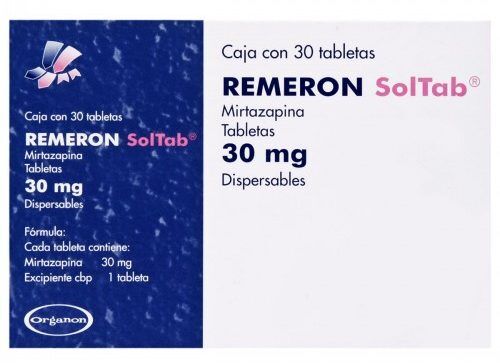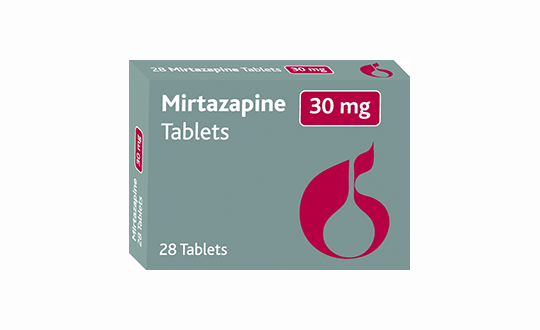Remeron (Mirtazapine)

Dosages
Remeron 30 mg
| Quantity | Price per pill | Total price | |
|---|---|---|---|
| 30 | $3.13 | $94.00 | |
| 60 | $2.48 | $149.00 | |
| 90 | $2.28 | $205.00 | |
| 120 | $2.17 | $260.00 | |
| 180 | $2.06 | $370.00 | |
| 270 | $1.99 | $537.00 |
Payment & Shipping
Your order is securely packed and usually ships within 24 hours. Below is what a standard package looks like.
It is about the size of a regular letter (9.4x4.3x0.3 inches) and shows no details about what is inside.



| Shipping Method | Estimated delivery |
|---|---|
| Express Free for orders over $300.00 | Estimated delivery to the U.S.: 4-7 days |
| Standard Free for orders over $200.00 | Estimated delivery to the U.S.: 14-21 days |









Discount Coupons
- Independence Day - July 4, 2026 10% JULY410
- Labor Day - September 7, 2026 7% LABOR07
- Thanksgiving - November 26, 2026 9% THANKS09
Brand Names
| Country | Brand Names |
|---|---|
 Argentina Argentina | Comenter Mitaxind Noxibel Tetrazic |
 Australia Australia | Avanza Axit Mirtazon |
 Belgium Belgium | Remergon |
 Czechia Czechia | Calixta Esprital Mirtastad Mirzaten Valdren |
 Denmark Denmark | Arintapin Combar Miramerck Mirtazon Mirtin |
 Finland Finland | Mirtachem Mirtamed Mirtaril Mirtazon Pharmazapine |
 France France | Norset |
 Germany Germany | MirtaLich Mirta TAD Mirtazelon Mirtazza Remergil |
 Greece Greece | Azapin Depreram Mirrador |
 Hungary Hungary | Mirtadepi Mirtel Mirzaten Mizapin |
 Mexico Mexico | Comenter Mirzalux Zapex |
 Netherlands Netherlands | Mirasol Mirzasna |
 Poland Poland | Esprital Mirtagen Mirtastad Mirtor Mirzaten Remirta |
 Portugal Portugal | Mirpax Mirtazon Psidep |
 Spain Spain | Afloyan Rexer Vastat |
| Manufacturer | Brand Names |
|---|---|
| Intas | Mirnite Mirtaz |
| Sun | Mirnite Mirtaz |
FAQ
Description
Introduction
Remeron is a well-known medication that has been classified as a tetracyclic antidepressant. It is administered to reduce symptoms of depression, including poor mood, anxiety, appetite loss, insomnia, and loss of interest in activities you might typically like.
This medication may be prescribed by your doctor for different reasons.

Recommendations for Use
Before taking the drug, consult a physician if any of the following apply to you or have previously affected you:
- Seizures.
- Heart problems, heart attacks, or strokes.
- A strange or adverse reaction to mirtazapine, other medications, foods, preservatives, or dyes.
- Liver or kidney disease.
- Angina, or pain in the chest.
- Bleeding from the stomach or intestines.
- Seizures, or epilepsy.
- Manic-depressive bipolar disorder, suicidal ideas or actions.
- Pregnancy, nursing, or intending to get pregnant.
| Dosage | Administration | Important Notes |
|---|---|---|
| Initial Dosage: 15 mg taken daily, preferably in the evening just before going to bed. |
Approach: Remeron is typically taken orally, either with or without meals. You can drink water and swallow the whole tablet. |
Regularity: To maintain consistent bloodstream levels and get the best effects, Remeron should be taken at the same time every day. |
| Maximum amount: 45 mg per day is often the highest amount that is advised. | Avoid Alcohol: Since alcohol can raise the chance of side effects like sleepiness and dizziness, it is advised to avoid alcohol when taking Remeron. | Remeron should not be stopped suddenly. To prevent withdrawal symptoms, it is important to gradually lower your dosage under medical supervision. |
|
Modification: Your doctor may change your dosage in accordance with how you personally react to the drug. |
Monitoring: In addition to monitoring your treatment, your healthcare professional may conduct regular assessments to evaluate the medication's efficacy and any possible adverse effects. | Precaution: When using Remeron, you must drink multiple glasses of water daily to protect your kidneys. |
Take the dosage as soon as possible if you forget to take it. Never take two doses at once if your next dose is almost due. Take one dosage at a time.
Overdosing on any medication can have detrimental effects on your health. Inform your doctor right away if you think you may have overdosed. Remeron overdoses can result in drowsiness, disorientation, rapid heartbeat, and memory loss.
Interactions
Remeron may interact with tricyclic antidepressants (such as nortriptyline, amitriptyline, moxapine, and doxepin), St. John's Wort, and benzodiazepines, which include diazepam, lorazepam, and oxazepam.
This list may be incomplete. Give your doctor a complete list of all the medications, herbal remedies, nutritional supplements, and over-the-counter medications you take.

Which Adverse Effects of This Medication Should I Be Aware of?
- Allergy reaction: itching, breathing difficulties, face, lip, or throat swelling, skin rash or swelling, hives.
- Menstrual problems.
- Gaining weight and becoming more hungry.
- Palpitations: a rapid, hammering, or irregular heartbeat.
- Mental and emotional swings: bizarre thoughts, strange dreams, lack of reality awareness, agitation, disorientation, hallucinations, fuzzy vision.
- Breathing issues and chest pain, fever, chills, and sore throat.
- Muscle stiffness, spasms, tingling in your hands or feet (tremor), or numbness.
- Bloating, gas in the stomach, cramping, indigestion, or disturbed stomach vomiting and nausea.
- Unusual bruises or bleeding.
- Headache, lightheadedness, ear ringing, or hearing loss.
- Urinary retention, diarrhea, red or black feces, blood in the urine, and vomiting.
- Diminished desire for sex, impotence, or trouble experiencing an orgasm.
- Problems with the liver, eyes, and skin
Other adverse effects could occur; this is not an exhaustive list. See your physician or pharmacist if you have these or other side effects.
How to Store
Remeron should be kept in a firmly closed container at room temperature, between 15 and 30 degrees Celsius (59 and 86 degrees Fahrenheit), out of light, heat, and moisture, and away from sinks, bathrooms, children, and animals.
If you would like additional information on this medication, contact your doctor.
Contact a medical professional first before giving the medication to a child.
















